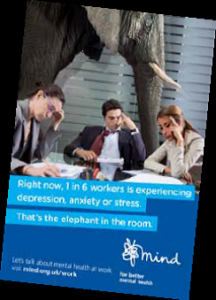Mental Health Awareness Week begins today in the UK.
While an increasing number of businesses are recognising the importance of worker mental health, more needs to be done.
There is a link between sickness levels through mental ill-health and the value an individual places on the work they do; if they believe their work is valued and important they are less likely to take sickness absence. The senior researcher at Tilburg University in The Netherlands, Dr Joosen, believes a better collaboration between worker and manager can greatly improve attendance.
We also have our regular pick of this week’s HSE cases.
This week’s 2 recent HSE cases look at:
- A Somerset pre-cast concrete products manufacturing company has been fined after a 43-year-old man was fatally injured when trapped by machinery.
- A scaffolding company has been sentenced today for safety breaches after a worker fell approximately four metres while working on a fragile surface.
As ever, if you have a subject that you would like us to cover one week, please contact us by phone 01458 253682, email or via our Facebook page or by Twitter.
Mental Health in the workplace
Work-related mental ill health costs the UK economy up to £26 billion every year through lost working days, staff turnover and lower productivity. Would you know how much mental ill health costs your organisation?
This article is an introduction to the issues and gives you pointers for improving the mental well-being of your workplace. Much of this information and guidance has been sourced from MIND who has been speaking out for better mental health for 60 years. For more information please look at www.mind.org.uk/work
What is poor workplace well-being?
A fifth member of staff, within a six-month period hands in their notice. The only reason given is that they have found a new job.
A member of staff has been off sick. You receive a doctor’s note stating that they have been diagnosed with depression. He is a great employee and you want him to come back to work. How do you support him to do so?
Below are some possible symptoms of poor mental well-being at work. In isolation they may not be too much of a problem. However, when work becomes the cause of mental distress among staff the costs to organisations quickly mount up. Poor mental well-being can lead to repeated staff absences and consistent difficulty for individuals to work at their best.
You announce a new contract or initiative that will bring huge benefits to your organisation. Ten minutes after telling everyone the fantastic news, you accidentally overhear your staff vigorously complaining about the change.
A fifth member of staff, within a six-month period hands in their notice. The only reason given is that they have found a new job.
A member of staff has been off sick. You receive a doctor’s note stating that they have been diagnosed with depression. He is a great employee and you want him to come back to work. How do you support him to do so?
In a study, the HSE found that a little over 1 million people are so stressed by their jobs that they believe it is making them ill and about 5 million people feel very stressed by their work. And yet employer awareness of mental health issues at work in the UK is poor. Most senior managers vastly underestimate the scale of the problem and most think it will never affect their workplaces (Sainsbury Centre for Mental Health,2007; Shaw Trust, 2010).
Other research (PricewaterhouseCoopers, 2008) has shown that health and wellbeing programmes increase employee satisfaction, lead to a higher company profile, higher productivity, reduced sickness absence and reduced staff turnover. An investment in staff wellbeing is an investment in your organisation
Creating mentally healthy workplaces
You have a legal ‘duty of care’ to protect your employees’ health, safety and welfare whilst at work. As part of that duty you must assess the risks arising from hazards at work, including work-related mental health problems.
To create a mentally healthy workplace you need to develop a comprehensive strategy that:
- promotes wellbeing for all staff
- tackles work-related mental health problems
- supports staff who are experiencing mental distress.
By doing this, you will create a place your employees want to work in and where they can perform well.
So how do you create this?
Before you rush off and develop or produce new policies, why not start by asking your workforce questions to gauge the present mental wellbeing of your workplace. If you don’t feel sure about this you can get an external company, such as Wilkins Safety Group to carry out this survey and analyse the results for you. The sort of questions you could ask are:
- Do you think that work has an impact on your mental wellbeing?
- Do you think that your mental wellbeing has an impact on your ability to do your work?
- Have you noticed work having an effect on your colleagues’ mental wellbeing?
- Are you affected by your colleagues’ mental health?
Plan
So once you have established what is happening at your business and that there is room for improvement, you should start to plan your actions.
Promote well-being
Let’s look again at the 3 symptoms mentioned earlier:
You announce a new contract or initiative that will bring huge benefits to your organisation.
Ten minutes after telling everyone the fantastic news, you accidentally overhear your staff vigorously complaining about the change.
The above scenario may simply mean staff members are having a ‘bad day’ but if you see it time and time again it might be symptomatic of poor workplace mental well-being.
Often good management is the key to unlocking the potential of your staff, reducing uncertainty and preventing unmanageable stress:
- Ensure that your staff have a good work/life balance. In the short term, long hours might seem manageable and boost productivity. However, a lack of sleep and relaxation time can quickly take its toll and lead to irritability, lower productivity and poor performance. So, if this is going to be a long term contract perhaps you might need to look to increase your workforce as opposed to increase the workload of the existing team.
- Engage employees in their work. Staff who know where your organisation is heading and are able to feed back their views will be better motivated and more able to help you meet your objectives. So talk to your employees.
- Explore introducing a flexible hours scheme. On occasion, we all need time off to visit the key cutters, the opticians or our child’s school. If staff are able to fit their lives around their workload, they will repay you with a stronger commitment to the organisation.
- Promote positive working relationships. Bullying, harassment and negativity are detrimental to a successful working environment. You must have an ‘Open door’ policy whereby employees can see their manager to discuss any worries about this in confidence.
- Communicate staff responsibilities and expectations clearly, this will help them achieve your organisation’s goals.
- Encourage exercise and social events. Physical activities boost staff health, team work and mental wellbeing.
Tackle the causes of mental ill health
A fifth member of staff, within a six-month period hands in their notice.
The only reason given is that they have found a new job.
If your work environment and relationships aren’t right you’ll struggle to recruit and retain good staff. Creating the right environment and supportive relationships between staff will prevent your staff from experiencing work-related mental health problems and help your organisation to thrive
- Make sure that work environments are suitable for the task. Noise, temperature and light levels can all have a big impact on wellbeing. Could space dividers, quiet spaces or music improve your workplace?
- Manage workloads among your staff. Make sure that no one is expected to deliver more than what they are capable of.
- Train managers to identify risks, recognise mental ill health and support their staff.
- For staff working in isolation, ensure there are clear and regular lines of communication. A monthly team meeting or a regular phone catchup will keep you in contact with these members of staff and enable you to prevent problems from occurring.
- Start a mentoring scheme to help new members of staff understand your organisation faster and to support them in their role. Or you could start a buddy system which enables colleagues to support other colleagues outside the official line-management structure.
Support staff
A member of staff has been off sick.
You receive a doctor’s note stating that they have been diagnosed with depression. He is a great employee and you want him to come back to work.
How do you support him to do so?
One in four people experiences mental distress in their lifetime. As an organisation you are likely to be affected in some way at some time. If staff have to take time off because of their mental health, the following approach can help them return to work while positively contributing to your organisation:
- If you become aware of a staff member experiencing mental distress the first step is to establish honest, open communication with them.
- Focus on the person not the problem. Ask them if they need adjustments to be made to their workplace conditions. They will often have all the expertise you will need to help them to manage the ups and downs of their condition
- Sometimes staff will need to take periods off sick due to mental ill health. If this happens remember four key things:
- Their expertise and experience have been and will continue to be valuable to your organisation.
- Keep in contact, make sure they know ‘out of sight’ is not ‘out of mind’.
- Explore adjustments that might be required to aid their return to work.
- Discuss the option of a phased return to work that allows the person to build up slowly and prevent a relapse.
Individuals who experience mental distress can continue to make a valuable contribution to your organisation with the right support. A recovery action plan can help you find out what will work best for them. Working with the individual to develop this will help you to identify together what the early signs of mental distress are, who you may need to contact and how your staff member would like to be supported. By planning in advance, you will be able to reduce the impact on your organisation and ensure the individual receives the support they need.
Mental health in the workplace
Below is a list of policies and practices to promote staff well-being taken from Mental health in the workplace: an employer’s guide, no.3 (Mind, 2010)
The job
- workloads that match employees’ abilities and experience
- reasonable and agreed deadlines for work completion
- reduction in repetitive duties within workloads
- a suitable working environment (consider noise, office lighting, equipment)
- clearly defined roles
- employee involvement in the planning of their workload
- freedom for employees to express any concerns regarding the compromise of personal or professional standards
- plans for employee training and development.
The organisation
- impartial and supportive supervision structures
- widely publicised and available supervision and support policies
- encouragement and promotion of mental disclosure within the workforce – employees need to feel confident that they can be open about health issues and that they will be taken seriously
- clear guidelines around mental health issues for managers
- detailed records on sickness absence used to analyse causes for absence
- promoted and accessible policies and guidance to challenge inappropriate behaviour such as racism, sexism and bullying.
Relationships in the workplace
- a supportive environment for employees; examples of good productive team work should be encouraged and shared
- inclusion: employees should not be made to feel isolated due to the nature of the work they do or as a result of more personal factors such as cultural or religious beliefs, race, sexuality, disability, age and gender.
Career and personal development
- clear supervisory and appraisal structures involving the employee
- sufficient opportunities for staff to take part in training or apply for promotion
- the views of employees with respect to job satisfaction, career development and training needs.
Personal issues affecting staff
- management awareness of relevant personal issues affecting staff such as illness, bereavement, financial worries or stress-related factors which might be contributing to them struggling to cope in the workplace
- policies in place for dealing with such issues
- training for managers to deal with such issues.
Implementing even some of these practices can make a major impact on staff wellbeing and save you money. If you would like more tailored, hands on advice please contact Mind to find out about resources, support and their consultancy service, Mind Workplace, at www.mind.org.uk/workplace
Act today
Reaping extensive benefits from improved employee mental wellbeing will require long-term commitment to the issue. But you can start benefiting from a more mentally healthy management style today.
- Take a walk around your workplace at lunchtime, how many of your staff are still sat at their desks? Suggest that they take a lunch break every day. By taking a break at midday you can help your brain relax and ensure you are as productive at the end of the day as you are at the start.
- When you leave, work tell your staff it’s time to go home – if there is no one to tell, maybe you should consider working shorter hours? Working shorter hours will not only benefit your personal life, it will make sure when you are at work you are rested and ready to perform at your best.
- Introduce yourself to staff. How many people do you work with that you’ve never spoken to? Talking regularly to all your employees could give you a better sense of what is happening on the ground.
- Enjoy some team time with your staff and have some time out of the office. Organise a lunchtime activity such as a softball match, a picnic or just eating out.
If you would like any further help or support, please please contact us by phone 01458 253682, email or via our Facebook page or by Twitter.
Taunton & Somerset CPD Group at The Exchange House Taunton
Please remember that we now run these CPD events at the Exchange House, 12 – 14 The Crescent, Taunton TA1 4EB.
The next of the CPD events is listed below.
As previously requested, if you could let us know whether or not you can attend it would be greatly appreciated. Also, if you would like to give a talk, or know of somebody who would, please contact Jon at [email protected]
Our next Seminar will be on 16th May 2018. Could you please arrive by 12:30pm prompt.
Our speaker for this one is David Holmes from Sika Limited with their recently updated RIBA approved CPD entitled “Roofing Solutions, Managing Risk for the Principal Designer”.
If you haven’t already booked your place, or if you are not on the CPD Seminar mailing list but would like to be please drop Jon an email and he will deal with your request.
As per our last one if you could let Jon know whether or not you can attend within 7 days of receipt of his email, it would be greatly appreciated.
Contact Details: [email protected], 07831 714199 or 01458 253682
FREE Health and Safety event
We are hosting a free to attend Health & Safety event on Thursday 14th June 2018 at the Taunton Racecourse, Orchard Portman, Taunton TA3 7BL.
This will cover ALL businesses in the morning and then mainly construction related businesses in the afternoon.
We will look at what you need to do to meet your legal requirements regarding Health and Safety and it will give you the opportunity to discuss your needs with members of our team, including Occupational Health & Safety Specialists, CDM Consultants, Asbestos Surveyor, COMAH Expert and our Fire Consultant.
There will be a couple of short talks in each session with a finger buffet lunch when you can talk to our team as well as network with other attendees.
Please note: Places are limited so book as soon as you can. For more information and to book your place call the Wilkins Safety Group Ltd on 01458 253682 or email us at [email protected]
